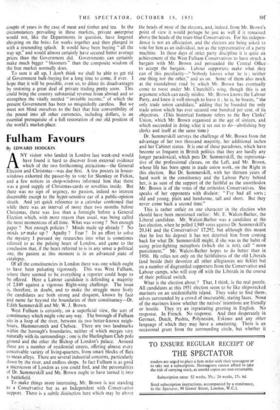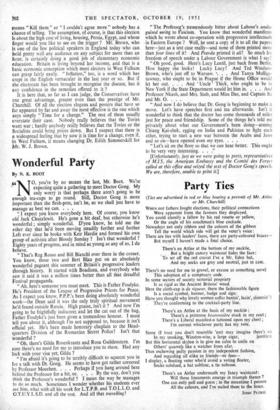Fulham Favours
By EDWARD HODGKIN
ANY visitor who landed in London last week-end would have found it hard to discover from external evidence which of the two forthcoming attractions—the General Election and Christmas—was due first. A few posters in house- windows exhorted the passer-by to vote for Slumkey or Fizkin, and a few notices in shop-windows inforMed him that there was a good supply of Christmas-cards or novelties inside. But there was no sign of urgency, no passion, indeed no interest discernible except to the hyper-sensitive ear of a public-opinion sleuth. And yet quick reference to a calendar confirmed that while there was an interval of more than two months before Christmas, there was less than a fortnight before a General Election which, with more reason than usual, was being called the most momentous of all time. What was wrong ? Not enough paper ? Not enough policies ? Minds made up already ? No minds to' make up ? Apathy ? Fear ? In an effort to solve the mystery I pursued my researches into what is sometimes referred to as the pulsing heart of London, and came to the conclusion that, if the heart referred to is in any sense a political one, the patient at this moment is in an advanced State of catalepsy.
Of 'all the constituencies in London there was one which ought to have been pulsating vigorously. This was West Fulham, where there seemed to be everything a reporter could hope to be offered. Here a Labour candidate is defending a majority of 2,849 against a vigorous Right-wing challenge. The issue is, therefore, in doubt, and to make the struggle more lively the candidates are both strong and eloquent, known by face and name far beyond the boundaries of their constituency—Dr. Edith Summersk ill and Mr. W. J. Brown.
West Fulham is certainly, on a superficial view, the sort of constituency which might vote any way.- The borough of Fulham sits in a loop of the river, between its two better-known neigh- bours, Hammersmith and Chelsea. There are two landmarks within the borough's boundaries, neither of which merges very naturally with its surroundings ; one is the Hurlingham Club polo ground and the other the Bishop of London's palace. Around these are a number of residential streets, offering almost every conceivable variety of living-quarters, from smart blocks of flats to mean alleys. There are several industrial concerns, particularly down by the river, and endless shops. In fact Fulham is as good a microcosm of London as you could find, and the personalities of Dr. Summerskiil and Mr. Brown ought to have turned it into a battlefield. - To make things more interesting, Mr. Brown is not standing as a' Consetvative but as an Independent with ,Conservative support. There is a subtle distinction here which may be above the heads of most of the electors, and, indeed, from Mr. Brown's point of view it would perhaps be just as well if it remained above the heads of the truer-blue Conservatives. For his indepen- ' dence is not an affectation, and the electors are being asked to vote for him as an individual, not as the representative of a party machine. In these days of strict party discipline it is quite an achievement of the West Fulham Conservatives to have struck a bargain with Mr. Brown and persuaded the Central Office– to accept the bargain. Labour supporters make what they can of this peculiarity—" Nobody knows what he is ; neither one thing nor the other," and so on. Some of them also mock at the roundabout road by which Mr. Brown has eventually come to roost under Mr. Churchill's wing, though this is an argument which can easily misfire. Mr. Brown knows the Labour Party, and knew it well.enough to leave it ; he is, he boasts, " the only trade union candidate," adding that he founded the only trade union which has ever secured one hundred per cent. of its objectives. (This historical footnote refers to the Boy Clerks' Union, which Mr. Brown organised at the age of sixteen, and which succeeded in doing what it set out to do—abolishing boy. clerks and itself at the same time.) Dr. Summerskill surveys the challenge of Mr. Brown from the advantage of her two thousand majority, her additional inches and her Cabinet status. It is one of these 'paradoxes, which have become so frequent in British politics that they are hardly any longer paradoxical, which puts Dr. Summerskill, the representa- tive of the professional classes, on the Left, and Mr. Brown, whose life has been spent in trade union work, on the Right in this election. But Dr. Summerskill, with her thirteen years of hard work in the constituency and the Labour Party behind her, is as sure of the support of the faithful as the unorthodox Mr. Brown is of the votes of the orthodox Conservatives. She speaks of her opponents with 'disdain: " I've had all sorts old and young, plain and handsome, tall and short. But they never come back a second time."
This is rather unfair on one character in the election who should have been mentioned earlier: Mr. E. Walcot-Bather, the Liberal candidate. Mr. Walcot-Bather was a candidate at the last election, when he polled 1,949 votes against Dr. Summerskill's 20,141 and the Conservatives' 17,292, but although this meant that he lost his" deposit it has not deterred him from coming back for what Dr. Summerskill might, if she was in the habit of using prize-fighting metaphors (which she is not), call " more punishment." Mr. Walcot-Bather hopes to do better than in 1950. He relies not only on the faithfulness of the old. Liberals (and beside their devotion all other allegiances are fickle) but on a number of disgruntled supporters from the Conservative and Labour camps, who will stop off with the Liberals in the course of their political switch.
What is the election about ? That, I think, is the real puzzle. All candidates at this 1951 election seem to be like shipwrecked mariners on an unidentifiable island. They wake to find them-, selves surrounded by a crowd of inscrutable, staring faces. None, of the mariners know whether the natives' intentions are friendly or hostile. They try an ingratiating greeting in English. No -response. In French. No response. And then desperately in German, Dutch, Pushtu, Polynesian, Eskimo and any other language of which they may have a smattering. There is an occasional grunt from the surrounding circle, but whether it means " Kill them " or " I couldn't agree more " nobody has a chance of telling. The assumption, of course, is that this election is about the high cost of living, housing, Persia, Egypt, and whose finger would you like to see on the trigger ? Me. Brown, who is one of the few political speakers in England today who can bold pretty well any audience on any subject for more than an hour, is certainly doing a good job of elementary economic education. Britain is living beyond her income, and that is a basic economic conception which most electors in West Fulham can grasp fairly easily. " Inflation," too, is a word which has crept in the English vernacular in the last year or so. But if the electorate has been brought to recognise the disease, has it any confidence in the remedies offered to it ?
It is here that, so far as I can judge, the Conservatives have one great advantage, greater even than the prestige of Mr. Churchill. Of all the election slogans and posters that have so far appeared by far and away the most effective is the one which says simply " Time for a change." The rest of them usually overstate their case. Nobody really believes that the Tories want war ; hardly anybody really believes .that the Tories or the Socialists could bring prices down. But I suspect that there is a widespread feeling that by now it is time for a change, even if, in West Fulham, it means changing Dr. Edith Summerskill for Mr. W. J. Brown.



































 Previous page
Previous page